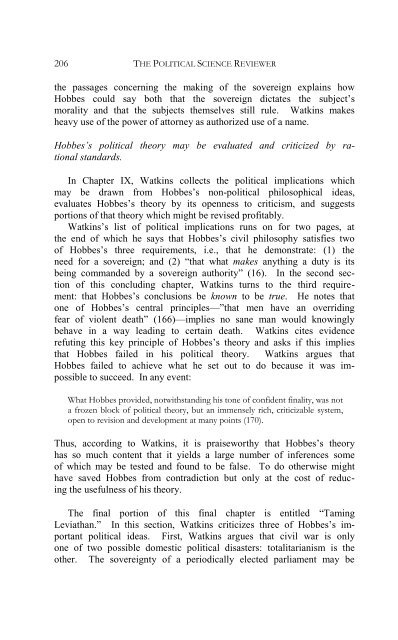Strauss and Watkins on Hobbes' Political Philosophy: A Review
Strauss and Watkins on Hobbes' Political Philosophy: A Review
Strauss and Watkins on Hobbes' Political Philosophy: A Review
You also want an ePaper? Increase the reach of your titles
YUMPU automatically turns print PDFs into web optimized ePapers that Google loves.
206 THE POLITICAL SCIENCE REVIEWER<br />
the passages c<strong>on</strong>cerning the making of the sovereign explains how<br />
Hobbes could say both that the sovereign dictates the subject’s<br />
morality <str<strong>on</strong>g>and</str<strong>on</strong>g> that the subjects themselves still rule. <str<strong>on</strong>g>Watkins</str<strong>on</strong>g> makes<br />
heavy use of the power of attorney as authorized use of a name.<br />
Hobbes’s political theory may be evaluated <str<strong>on</strong>g>and</str<strong>on</strong>g> criticized by ra-<br />
ti<strong>on</strong>al st<str<strong>on</strong>g>and</str<strong>on</strong>g>ards.<br />
In Chapter IX, <str<strong>on</strong>g>Watkins</str<strong>on</strong>g> collects the political implicati<strong>on</strong>s which<br />
may be drawn from Hobbes’s n<strong>on</strong>-political philosophical ideas,<br />
evaluates Hobbes’s theory by its openness to criticism, <str<strong>on</strong>g>and</str<strong>on</strong>g> suggests<br />
porti<strong>on</strong>s of that theory which might be revised profitably.<br />
<str<strong>on</strong>g>Watkins</str<strong>on</strong>g>’s list of political implicati<strong>on</strong>s runs <strong>on</strong> for two pages, at<br />
the end of which he says that Hobbes’s civil philosophy satisfies two<br />
of Hobbes’s three requirements, i.e., that he dem<strong>on</strong>strate: (1) the<br />
need for a sovereign; <str<strong>on</strong>g>and</str<strong>on</strong>g> (2) “that what makes anything a duty is its<br />
being comm<str<strong>on</strong>g>and</str<strong>on</strong>g>ed by a sovereign authority” (16). In the sec<strong>on</strong>d sec-<br />
ti<strong>on</strong> of this c<strong>on</strong>cluding chapter, <str<strong>on</strong>g>Watkins</str<strong>on</strong>g> turns to the third require-<br />
ment: that Hobbes’s c<strong>on</strong>clusi<strong>on</strong>s be known to be true. He notes that<br />
<strong>on</strong>e of Hobbes’s central principles—”that men have an overriding<br />
fear of violent death” (166)—implies no sane man would knowingly<br />
behave in a way leading to certain death. <str<strong>on</strong>g>Watkins</str<strong>on</strong>g> cites evidence<br />
refuting this key principle of Hobbes’s theory <str<strong>on</strong>g>and</str<strong>on</strong>g> asks if this implies<br />
that Hobbes failed in his political theory. <str<strong>on</strong>g>Watkins</str<strong>on</strong>g> argues that<br />
Hobbes failed to achieve what he set out to do because it was im-<br />
possible to succeed. In any event:<br />
What Hobbes provided, notwithst<str<strong>on</strong>g>and</str<strong>on</strong>g>ing his t<strong>on</strong>e of c<strong>on</strong>fident finality, was not<br />
a frozen block of political theory, but an immensely rich, criticizable system,<br />
open to revisi<strong>on</strong> <str<strong>on</strong>g>and</str<strong>on</strong>g> development at many points (170).<br />
Thus, according to <str<strong>on</strong>g>Watkins</str<strong>on</strong>g>, it is praiseworthy that Hobbes’s theory<br />
has so much c<strong>on</strong>tent that it yields a large number of inferences some<br />
of which may be tested <str<strong>on</strong>g>and</str<strong>on</strong>g> found to be false. To do otherwise might<br />
have saved Hobbes from c<strong>on</strong>tradicti<strong>on</strong> but <strong>on</strong>ly at the cost of reduc-<br />
ing the usefulness of his theory.<br />
The final porti<strong>on</strong> of this final chapter is entitled “Taming<br />
Leviathan.” In this secti<strong>on</strong>, <str<strong>on</strong>g>Watkins</str<strong>on</strong>g> criticizes three of Hobbes’s im-<br />
portant political ideas. First, <str<strong>on</strong>g>Watkins</str<strong>on</strong>g> argues that civil war is <strong>on</strong>ly<br />
<strong>on</strong>e of two possible domestic political disasters: totalitarianism is the<br />
other. The sovereignty of a periodically elected parliament may be
















